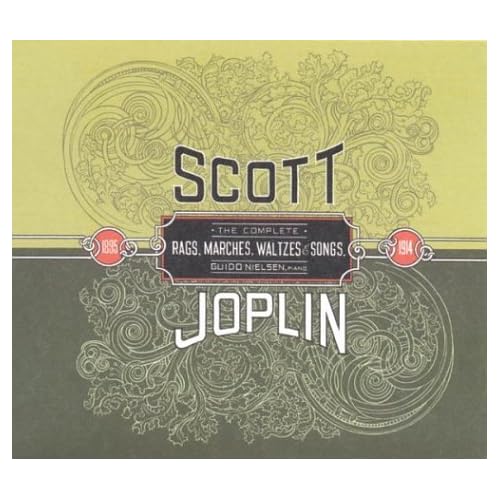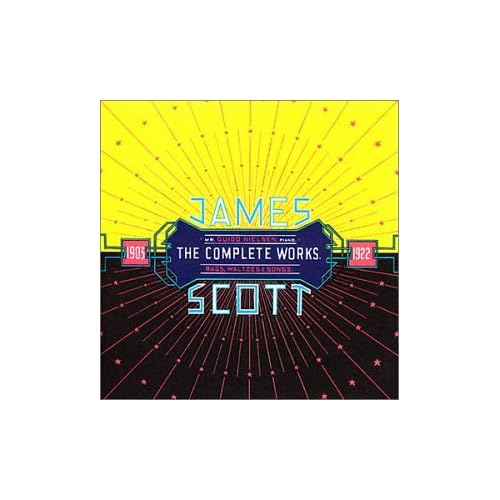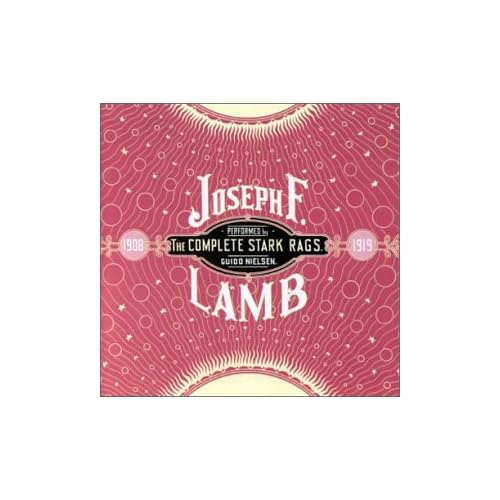Guido Nielsen



I have harbored an interest in ragtime music since, well, probably since seeing The Sting at age 11, and it has always frustrated me that any recording of ragtime I could find always sounded like it was recorded at the bottom of a well or else obscenely tarted-up, “cutified” to appeal to popular tastes (like, um, like the soundtrack to The Sting, for instance).
So when I stumbled across Guido Nielsen’s Scott Joplin: The Complete Rags, Marches, Waltzes and Songs at my local used record store, with a handsome package designed by no less an entity (and ragtime authority) than Chris Ware, I snapped it up.
The recordings are revelatory. Nielsen’s performances are clear-eyed, unadorned and unsentimental, letting the the compositions speak for themselves, and the recording is state-of-the-art in its clarity and precision. Impossible to listen to without experiencing overwhelming feelings of giddiness, optimism and joy, while still feeling the deep strains of melencholy and even tragedy that inform some of the melodies. This music is American life itself.
I enjoyed the set so much I sought out Nielsen’s recordings of two lesser-known Joplin disciples, Joseph F. Lamb and James Scott, again abetted by the lovingly lavish Chris Ware designs. They do not disappoint.
Mr. Nielsen hails from Amsterdam (figures, no American musician would treat his nation’s musical legacy with such respect and devotion), and emerges from the Beau Hunks Sextette, which has recorded definitive versions of Raymond Scott tunes and music from Little Rascals shorts. I recommend them all, especially Manhattan Minuet, which is one of my favorite recordings of all time and also features smashing design from Chris Ware.

Wow. Small world.
I play the piano, have done since about 12. It was Scott Joplin that kept me playing. I was bored of the formulaic music that my piano teacher made me play to pass my exams. I was losing interest until mt teacher got me a book of Joplin Rags. I was hooked! I even wrote a Rag for my GSCE exam in Music, lol.
I still play the Maple Leaf Rag and of course, The Entertainer as party pieces. From them I got into bluesmen like Fats Waller, and older composers like Debussey (who is the precursor of Ragtime). That collection sounds great. I should have some in my music collection. They did a musical of Joplins life in the 80’s and we had a copy of the soundtrack. I think it was called The Prodigal Son.
And The Sting is a fantatsic movie. Repeatedly watched it as a kid. One of the best endings ever. And Joplin won a posthumous Oscar I believe as well. Excellent taste, sir!
Well, famously, Joplin did not win an Oscar, that honor went to Marvin Hamlisch, who turned Joplin’s dignified compositions into sappy Hollywood soundtrack music.
I dearly love The Sting, but something about the music has always bothered me (and not just Hamlisch taking credit for Joplin). Last night I did the math, and I realized that a director in 1973 making a movie about 1933 and scoring to the music of 1903 would be akin to a director today making a movie about 1967 and scoring it with hits of the 1930s. So you would have the big “Vietnam Protest” scene and on the soundtrack you’d hear Louis Armstrong’s recording of “Stardust,” and during the “Haight-Ashbury LSD Freakout” scene you’d hear Ethel Waters singing “I Got Rhythm.” It might be ironic but it would hardly be considered appropriate.
On the other hand, it could be said I suppose that Joplin was thirty years ahead of his time, which would make it completely appropriate.
“Solace” still makes me cry.
But “Easy Winners” picks you right back up!